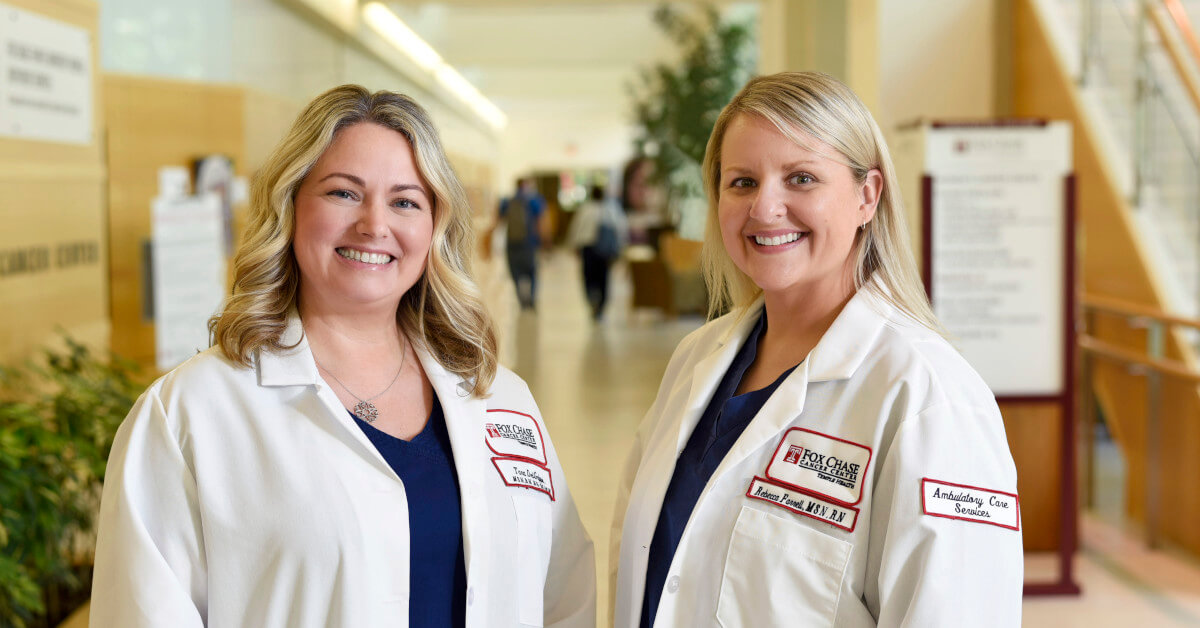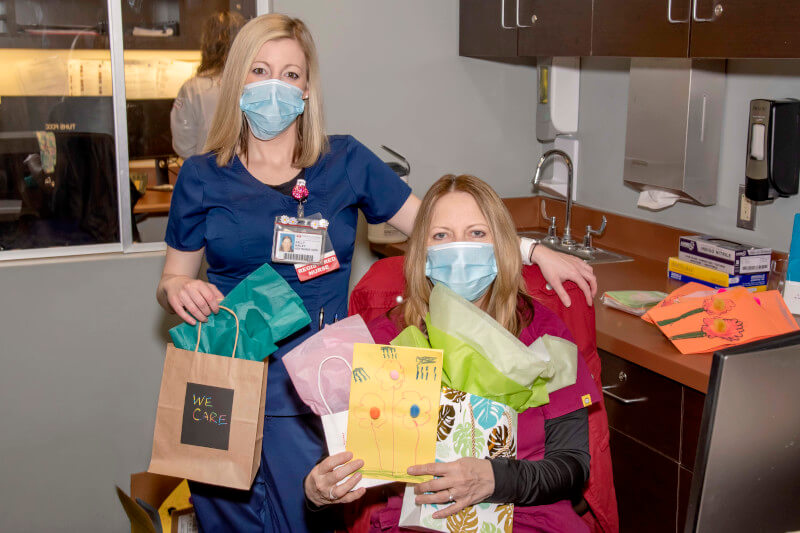
On the Front Lines of COVID-19: How Nurses at Fox Chase Held It Together and Continued to Give
-
By Marian Dennis
In March 2020, Fox Chase Cancer Center was among thousands of healthcare facilities around the country facing the challenge of providing a continued high standard of care while adapting to changing information and protocols surrounding the emergence of COVID-19 in the United States.
At the forefront of this pandemic have been nurses who, day in and day out, are charged with not only caring for the physical health and mental well-being of their patients, but also with an immeasurable amount of behind-the-scenes work that ensures that operations run smoothly.
Tackling the Tough Obstacles
One of the most significant challenges for nurses has been the emotional toll of the virus. Rebecca Farrell, MSN, RN, clinical manager at Fox Chase Cancer Center - Huntingdon Pike, said their phone triage was flooded with concerned patients in the first few weeks of the pandemic.
“Patients were very scared and had a lot of questions. They wanted to know if they could still have treatment for their cancer. My nursing staff was in overdrive and very overwhelmed. Our calls went from about 400 calls a day to about 800 to a thousand calls a day,” she said.
Farrell added that during this time, nurses did not and still haven’t asked for anything extra. In fact, many nurses stepped up to the plate, taking additional shifts and working long hours to help out where they could.
As infection numbers began to rise, Fox Chase implemented safety measures that restricted visitors for patients coming in for treatment. What could already be an overwhelming journey for patients also became a lonely one. The responsibility of easing that struggle rested heavily on the minds and shoulders of many nurses working one-on-one with patients.
“Unfortunately for infusion nurses, working from home isn’t an option, so from the beginning, we were here every day and maintaining our volumes,” said Tara DelGrippo, MSN, RN, NE-BC, OCN, clinical director of Ambulatory Care and Infusion Services at Fox Chase.
“It has been very difficult for some of our patients who are used to having somebody come in or our new patients who are not familiar with the process. The nursing staff has gone above and beyond to make sure that those little things we had done before, like spending time with the patients, gets done.”
DelGrippo and Farrell commended nursing staff for their efforts in alleviating patient anxiety and ensuring, even in the midst of constantly challenging circumstances, that appointments run smoothly.
“Nurses were using their personal cell phones, because at the beginning we didn’t have the clinical iPads that we could use to call a patient’s family. The nurses would connect the patients with their loved ones who were out in the parking lot during the patient’s visit. But not once did the nurses ever complain,” said Farrell. “The nurses have been the glue. They kept everything stable. They were even keeled, and, no matter what, they just got it done. No matter what role they were asked to fulfill, they did it.”
The Value of Teamwork
Farrell said the nurses were able to get through those difficult spots by leaning on each other and working interdepartmentally to accomplish goals that benefit both patients and staff.
Perhaps one of the most impactful ways collaboration and support among nurses, doctors, and other Fox Chase faculty has proven invaluable was the development of Fox Chase’s telehealth system. Doctors and nurses from areas including the Division of Urology and Urologic Oncology worked together with nurses from ambulatory care to determine the best way to handle this new form of patient visits. Farrell said when clinical operations stopped, she and urologic oncologist Alexander Kutikov, MD, worked around the clock for three weeks to implement telehealth.
“We had no program and we needed to keep people on treatment and being seen. The nurses in urology picked it up fairly quickly, and they really led the charge in our telemedicine program that we now have going on here,” said Farrell.
Additionally, nurses worked with multiple departments around Fox Chase to rally volunteers for COVID-19 screenings at building entrances during the height of the pandemic. Once vaccines became available at the end of January, they continued to work closely with various departments in the process of creating, scheduling, and running vaccine clinics.
“Other ambulatory leaders and I worked together nonstop to try to operationalize this and figure out scheduling, staffing, and the physical layout for vaccine clinics. By February 1 we had started to schedule our patients,” said Farrell.
“We all divided and conquered. I took on the scheduling piece, and by the night of February 2, we had about 120 people on the schedule for February 3. Everything was done manually, and we were working off of spreadsheets and with the city, sending them our numbers at the end of each night.”
Farrell said she hasn’t stopped scheduling patients for COVID-19 vaccinations since February, but added that they have since received volunteer help with both the scheduling process and vaccine clinics.
Continuing to Give

Fox Chase nurse Kelly Bailey, RN, BSN and clinic assistant Christine Kappler created the We Care Project to bring joy to patients who were facing cancer treatment alone during the pandemic Despite the many challenges that COVID-19 has presented, nurses at Fox Chase have consistently found ways to encourage and care for patients who are still navigating their cancer journey. One example of this is the We Care Project, created by ambulatory care nurse Kelly Bailey, RN, BSN.
“Kelly had a young patient with colon cancer and she found out it was his birthday. He was by himself because patients aren’t allowed to have visitors right now because of the pandemic. So she ran all over the building to find a birthday gift for him,” said Christine Kappler, a clinic assistant at Fox Chase who helped Bailey develop the project.
“She came up with the idea that we needed to do something for these patients during COVID because they’re anxious, they’re sad, and we should just let them know they’re loved and we’re here for them,” Kappler added.
Bailey took the idea to management, who then implemented the program. Nurses in the department helped donate gifts, and as news spread throughout Fox Chase, Kappler said they have been receiving donations from co-workers, doctors, and outside donors.
Kappler said the gifts have made a big impression on patients. She recalled one instance where a patient was brought to tears by the gift. “His wife had just died about a month ago and this was probably the only present he would be getting for his birthday. So it has just been really touching.”
Kappler said seeing patients come in alone for treatments and follow ups has been particularly hard for the nurses. For this reason, she hopes they can continue to keep the We Care Project going for as long as they can and continue to find ways to show patients they are loved, supported, and appreciated, even if just with small gestures.

